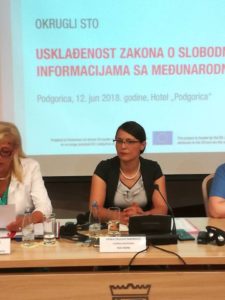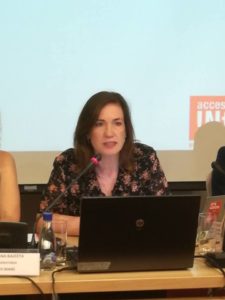The existing Law on Free Access to Information (Law on FAI) is not in line with key international standards and represents a major obstacle in fight against corruption, it is concluded at the round table “Alignment of the Law on Free Access to Information with International Standards”, organized by MANS in Podgorica. The panelists agreed that the existing law should be amended as soon as possible.
 “The Law on Free Access to Information is like an oxygen for fight against corruption, thanks to which MANS managed to discover numerous corruption cases,” said Vanja Ćalović Marković, Executive Director of MANS. As she explained, had there not been for this law, there would be no verdict against Svetozar Marović, no initiation of proceedings against Miomir Mugoša and Žarko Pavićević, and we would be unfamiliar with privatizations of Aluminium Power Plant and Telekom. Also, we would not be able to stop the plans for the Salt Mine, nor discover the links between state officials and Saric’s clan, as well as the connection between Prva Banka, the government and the Electric Power Company, as well as how the electricity price is calculated. We would also not be able reveal numerous cases of illicit enrichment of public officials, pointed out Ćalović Marković, adding that all of this was the reason for amending the Law in an entirely secret procedure. The result is that today in Montenegro we have more secrets than ever, thus, the budget of some municipalities in Montenegro also became secret.
“The Law on Free Access to Information is like an oxygen for fight against corruption, thanks to which MANS managed to discover numerous corruption cases,” said Vanja Ćalović Marković, Executive Director of MANS. As she explained, had there not been for this law, there would be no verdict against Svetozar Marović, no initiation of proceedings against Miomir Mugoša and Žarko Pavićević, and we would be unfamiliar with privatizations of Aluminium Power Plant and Telekom. Also, we would not be able to stop the plans for the Salt Mine, nor discover the links between state officials and Saric’s clan, as well as the connection between Prva Banka, the government and the Electric Power Company, as well as how the electricity price is calculated. We would also not be able reveal numerous cases of illicit enrichment of public officials, pointed out Ćalović Marković, adding that all of this was the reason for amending the Law in an entirely secret procedure. The result is that today in Montenegro we have more secrets than ever, thus, the budget of some municipalities in Montenegro also became secret.
 Helen Darbishire, Director of Access Info Europe, while presenting key findings of the analysis of the Law on FAI in Montenegro, sharply criticized the latest amendments from 2017, which had a negative impact on the Law, especially when it comes to the first article of the Law. As she explained, Article 1 in the first paragraph clearly stipulates that the right to free access to information is prescribed by this Law. However, in the second paragraph, the same article contains a series of exclusions relating to information for which there is an obligation to keep a secret, which is regulated by other acts. This, according to Darbishire, makes the Law unharmonised primarily with itself, but also with important international standards and the Constitution of Montenegro.
Helen Darbishire, Director of Access Info Europe, while presenting key findings of the analysis of the Law on FAI in Montenegro, sharply criticized the latest amendments from 2017, which had a negative impact on the Law, especially when it comes to the first article of the Law. As she explained, Article 1 in the first paragraph clearly stipulates that the right to free access to information is prescribed by this Law. However, in the second paragraph, the same article contains a series of exclusions relating to information for which there is an obligation to keep a secret, which is regulated by other acts. This, according to Darbishire, makes the Law unharmonised primarily with itself, but also with important international standards and the Constitution of Montenegro.
International expert on free access to information stressed that it is the law that has been a standard for many years in the European Union. The right to information is, according to her, a fundamental right rather than an option, which all authorities of countries considered democratic must respect without exception.
As key recommendations for improving the existing Law on FAI, Darbishire stressed the application of this law to all information, priority of the Law on FAI in relation to other laws, limitation of exceptions, increase in proactive publication of information, as well as active participation in Open Government Partnership in order to increase transparency.
Jadranka Vukčević, representative of the Ministry of Public Administration, said that there is room for improving the area of free access to information, which was also recognized by the Government through new strategic documents, such as the Action Plan for implementation of the Public Administration Reform Strategy until 2020. With this document, the Government has committed to conduct an analysis of the normative framework in the area of free access to information, which should precede the drafting of the Law on Amendments to the Law on Free Access to Information in 2019.
Maja Smrkolj, representative of the European Commission, reminded that the right to free access to information is of exceptional importance in the context of joining the European Union, and that it is directly related to freedom of speech and the right to political participation. “The principle of transparency is present in the administration of the European Union in various documents, such as the EU Treaty and the Treaty on the Functioning of the EU,” she stated.
“Since the beginning of 2017, 3799 lawsuits regarding free access to information have been filed to the Administrative Court, and in the previous year 12 000, said Ana Perović Vojinović, judge of the Administrative Court. She pointed out that it is difficult to deal with such a large number of lawsuits and that the circumstances often hinder and slow down the work of the Administrative Court.
By 2016, the Agency for Personal Data Protection and Free Access to Information rejected appeals in only 8 to 10% of cases, while the percentage of the refusal of complaints was five times higher. A member of the Agency Council, Radenko Lacmanović, believes that the existing law is a step backwards in relation to the previous legal solution and pointed to the legal unsustainability and linguistic illogicality of the controversial Article 1, as well as to “carelessness and incapacity of those who were incompetent in limiting the right to access information”. He specifically highlighted the issue in relation to Article 14 concerning the restriction of access to information in which, according to the latest amendments, there is also possibility of limitation in the case of tax or business secrets. Lacmanović called for urgent amendments to the Law.
Vuk Janković, coordinator of the MANS Legal Program, explained how DPS’ MPs by amending the Law far from the public eye enabled hiding of key data, such as privatization of the largest companies in Montenegro, data related to construction of the highway, the largest project in the history of Montenegro, as well as the budget of some municipalities in Montenegro. Keeping such data secret directly instigates corruption, for which this Law is an institutional cover. Thus, MANS invites the Ministry of Public Administration to form a Working Group to amend the Law on Free Access to Information as soon as possible so that the new legal solution is in accordance with international standards and the Constitution of Montenegro. This would enable realization of a fundamental right to information and establishment of an adequate legal mechanism that would significantly reduce the space for corruption.
More than 60 representatives of state institutions and civil sector participated in the Round Table.
Round Table video is available here
Videos of the panelists’ presentations are available on the NGO MANS’ YouTube channel
Helen Darbishire’s presentation is available here (English)
Vuka Janković’s presentation is available here (local language)
Case Study – “Political parties and money – from public to secret” (local language/English)
Summary of the analysis of the Law on Free Access to Information, conducted by Access Info Europe, is available here (local language/English)



